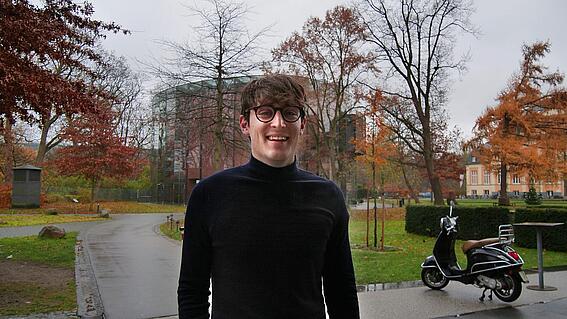What is your home university?
As a student in a double degree program in Italian and French Law, my home universities are the University of Florence, where I started my legal education, and the University Paris I Panthéon-Sorbonne, where I pursued my studies during the third and the fourth year.
How is studying different here?
Coming from four years of studies in Florence and Paris, I found Hamburg and especially Bucerius Law School an incredibly open, dynamic and welcoming place. The students I have met here are extremely eager to get to know fellow students with different backgrounds and keep in contact with them. This is something I had never experienced before, especially to this extent, and that made my period here even more enjoyable.
Why have you chosen a double degree in French and Italian Law?
Since I was a kid, I have always wanted to study law. As the end of high school approached, I became more and more eager to experience living elsewhere in Europe and engage in legal studies that would be less centered on national law and practice, as it is often the case in Italy where I am originally from.
Thus, when I found out about this program, I took this as a chance to deepen my knowledge of French, which ultimately led me to fall in love with Paris and its cultural tradition during my study trips. And the motivation went through the roof.
Why do you find this specific connection important?
I believe that in a context where EU Members’ legal systems are ever more interconnected and integrated, it is important to educate lawyers that are at ease with roaming about different European legal systems and cultures.
This is why over the years my home universities have built several double degree programs with partner universities in Europe (Italian-German, French-German, French-Spanish…): in a hopefully ever closer Union, it is important that European lawyers adapt to the changes we are assisting and consider alternatives to approaches limited to one Member State’s jurisdiction.
What opportunities can arise from a connected study like that?
Since Italy and France are natural partners on every possible level (be it commercial, political, military etc.), the exchanges between these two important economies and countries of the Eurozone are a daily and extremely relevant matter. Consequently, the call for lawyers is persistent in every legal field.
For instance, the fact of acquiring two full degrees in both jurisdictions allows graduates to pass the bar in both jurisdictions and easily run through both legal systems with a certain flexibility.
This makes them a precious asset for law firms, not only boutiques following Italian-French clients and disputes, but also large firms advising clients that carry out business - or wish to expand it - in both countries. However, many graduates pursue a professional path also in the public sector, serving either in national or in European and international institutions.
What challenges do you see in the future regarding that area?
On a general level, an important challenge that concerns all the double degree programs I mentioned above is to demonstrate and show established professionals with a more traditional background the added value that graduates can bring to their law firms, companies, etc.
Therefore, this process will undoubtedly need some time and it will be through the tenacious work of graduates who will prove their worth once they enter the legal market that this initial obstacle will eventually be overcome.
What is Germany’s role in this relationship?
Germany, France and Italy being the three largest economies of the Eurozone, their coordinated partnership will prove fundamental to ensure the resilience of the European project, that constitutes the foundation of Italian-French relationships and the framework in which Italian-French lawyers operate.
If these trilateral relationships are fostered not only by the action of European institutions and national governments, but also by the expansion of German firms, a more integrated legal market will be beneficial to all, and ultimately to those lawyers who are used to reasoning with a comparative mindset.
How do your studies in Germany complement your studies of French-Italian law?
When I was choosing my destination for my exchange program, I turned automatically to Germany to complement and strengthen my European profile, for at the end of the program I will have had the chance of studying in the universities of the three most important founders of the European project.
Furthermore, the International Exchange Program at Bucerius has the academic advantage of being one of the few of its kind to offer a subject specialization in International and Comparative Business Law. It allowed me to further explore topics I was already interested into and to analyze subjects with a more wide-ranging approach (such as Corporate Law, that I had studied before from a national perspective, firstly in Italy, then in France).
What distinguishes Hamburg from Paris the most?
Hamburg and Paris are undoubtedly different cities offering very differing vibes. If Paris is a tremendously vibrant and often chaotic capital with its pros and cons, Hamburg has the great advantage of being a big city but still very calm and quiet in most of its neighborhoods without necessarily being less lively or energetic, which makes it perfect for a balanced but still fun and enjoyable university life.

